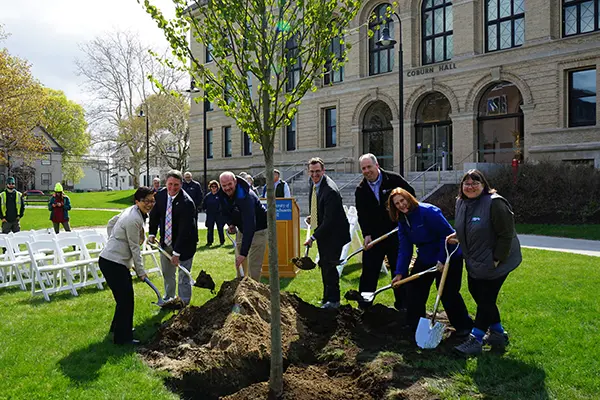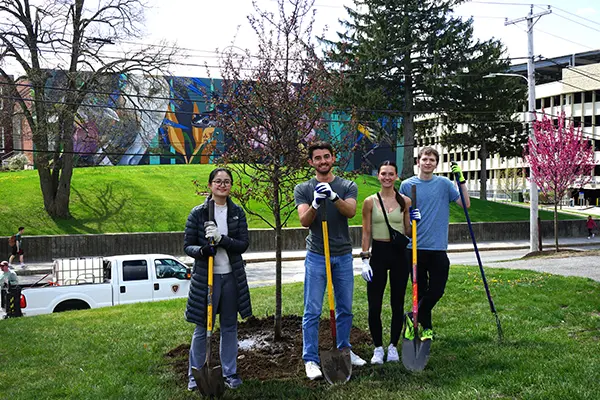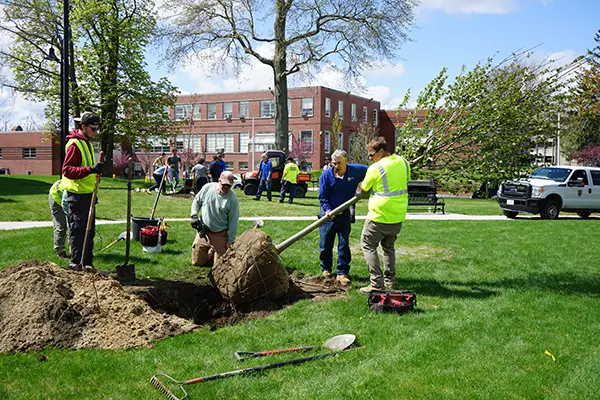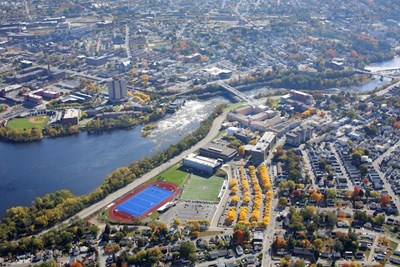With Over 1,300 Trees, UML Receives Arboretum Accreditation from ArbNet
 Image by Brooke Coupal
Image by Brooke Coupal
04/26/2023
By Brooke Coupal
Equipped with shovels, Chancellor Julie Chen and members of the UMass Lowell and local communities tossed the final piles of soil next to a young katsura tree in front of Coburn Hall.
The ceremonial planting, held just before Arbor Day, signified UMass Lowell’s new role as a certified arboretum – a place where trees and other plants are cultivated for scientific and educational purposes.
“The recent certification acknowledges not just the abundance and diversity of our campus plantings, but also the way the UML community uses our campus as a living laboratory,” Chen says.
With more than 1,300 trees spread across three campuses, UMass Lowell earned Level II arboretum accreditation this year from ArbNet, an international coalition of arboreta.
Since 2011, UMass Lowell has been a designated Tree Campus through the Arbor Day Foundation, but Grounds Operations Manager Kevin Block says the arboretum certification takes things to the next level.
“Becoming an arboretum shows our commitment to enhancing the cultivation and curation of our collection of trees,” he says.
For Director of Sustainability Craig Thomas, the certification is another example of UMass Lowell being at the forefront of urban sustainability.
“The parts of campus around our buildings really make up the place where our students, faculty and staff spend their time,” he says. “The certification pushes us to think about how we can do more with these spaces.”
 Image by Brooke Coupal
Image by Brooke Coupal
Block and Thomas are members of the UML Arboretum Advisory Committee, which also includes representatives from the Department of Environmental, Earth and Atmospheric Sciences, the Student Government Association, Advancement and Alumni Relations and Campus Planning. The committee crafted an arboretum master plan, which details the development and management of the living plant collection.
This collection helps elevate the university’s aesthetic and provides educational opportunities for faculty and students. There are more than 140 species of trees and shrubs on campus that can be used for research projects, such as examining how certain trees respond to the university environment or how shrubs increase food sources for songbirds.
As a student in the Honors College, sophomore Catherine Kleeman sees the arboretum as a perfect resource for those looking for honors thesis ideas.
“The arboretum opens up a lot of opportunities for students to do research, which is really awesome,” says the Gibbsboro, New Jersey, native who is majoring in environmental science with a concentration in sustainability.
EEAS Asst. Prof. Joy Winbourne already uses the arboretum for her research. She is collaborating with Jasmina Burek, an assistant professor in the Department of Mechanical and Industrial Engineering, and mechanical engineering Ph.D. student Alana Smith to examine the net benefits of transforming a vacant lot into a food forest instead of a managed lawn area.
This summer, Winbourne also plans to research how the urban environment and extreme weather events, such as heat waves, impact the cooling benefits trees on campus and in the city provide by moving water from the ground to the atmosphere.
“As an urban ecologist, I study how trees and soils in the city cycle carbon, water and nutrients, and the implications of that on cities reaching their sustainability goals,” Winbourne says. “For my students and me, the UML arboretum acts as a test bed for studying innovative sustainability solutions.”
 Image by Brooke Coupal
Image by Brooke Coupal
“I love the learning-living lab opportunity that the arboretum brings to this city,” says Trust Executive Director Jane Calvin, who envisions using the tree collection as a way to get youth and adults more engaged in conservation.
UMass Lowell’s arboretum will continue to grow with the addition of new trees and shrubs planted every year around Arbor Day.
William Lefebvre, a sophomore environmental science major with a concentration in sustainability, is one of several students who helped with this year’s planting of 36 shrubs and 23 trees.
“I think it’s really great that UMass Lowell is making these initiatives,” says the Lancaster, Massachusetts, native. “It’s another step toward UMass Lowell being a more sustainable campus.”
To keep informed about future events and developments of the campus arboretum and sustainability efforts, fill in UML’s Alumni and Friends interest form.


